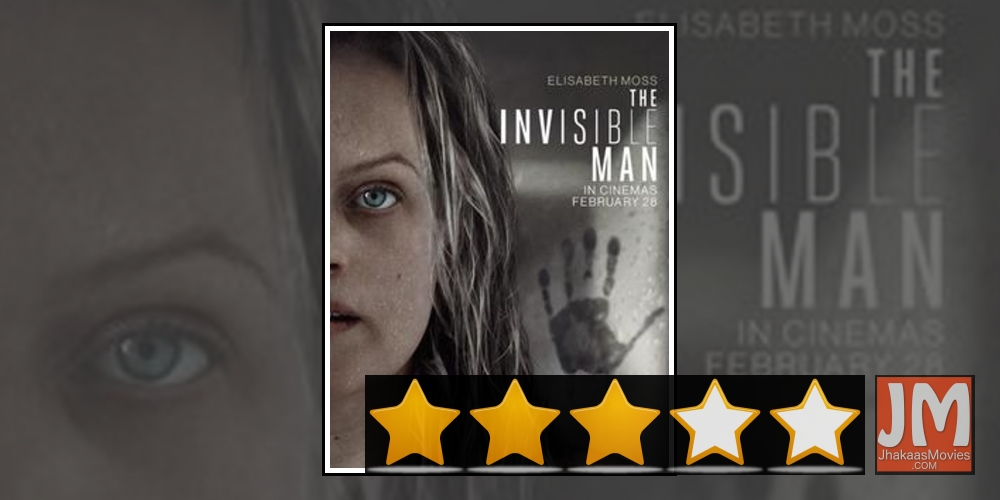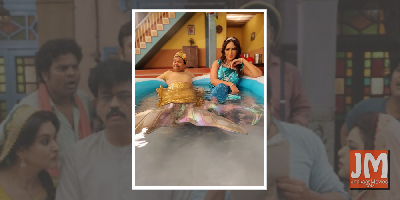 Aan Tiwari honoured with Best Child Actor award for Baal Shiv
Aan Tiwari honoured with Best Child Actor award for Baal Shiv Ghategi rahasymayi ghatnaye!
Ghategi rahasymayi ghatnaye! Amazon Prime Video unveils the 2021 Festive Line-up; brings a heady mix of Indian and International titles on the service
Amazon Prime Video unveils the 2021 Festive Line-up; brings a heady mix of Indian and International titles on the service Release: Music video of, Yeh Haalaath, from Mumbai Diaries 26-11
Release: Music video of, Yeh Haalaath, from Mumbai Diaries 26-11 Bhumi Pednekar feels she shares feel-good value with Akshay Kumar on screen
Bhumi Pednekar feels she shares feel-good value with Akshay Kumar on screen
Review: 'The Invisible Man': Astutely reinvented and relevant

By Troy Ribeiro
Film: "The Invisible Man"; Cast: Elisabeth Moss, Aldis Hodge, Storm Reid, Harriet Dyer, Michael Dorman, Oliver Jackson-Cohen; Direction: Leigh Whannell; Rating: *** (3 stars)
Writer-Director Leigh Whannell's "The Invisible Man" is a science-fiction horror thriller. It is contemporary, relevant and a completely reinvented adaptation of HG Wells' novel of the same name and a reboot of "The Invisible Man" film series.
The narrative begins on an unsteady note. In the dead of the night, a petrified Cecilia Kass (Elisabeth Moss), suffering from PTSD, stealthily escapes the prison-like complex where she lives with her husband Adrian Griffin (Oliver Jackson-Cohen), a brilliant scientist and wealthy tech entrepreneur.
Heading to nearby San Francisco, Cecilia counts on her sister Emily Kass (Harriet Dyer) and their childhood friend James (Aldis Hodge) for support.
In fact, she temporarily puts up with James and his teen daughter Sydney (Storm Reid) where she confides in them, that she was in a coercive relationship with her husband, who was in total control of everything, of what she said or thought, and hence her desperate need to escape.
Everything is fine till, two weeks later, Adrian commits suicide and his brother Tom (Michael Dorman), a lawyer acting as executor to Adrian's will, informs her that Adrian has left her a generous portion of his vast fortune. Cecilia suspects that Adrian's death is a hoax and that he is still trying to control her life, especially after a series of eerie coincidences turn lethal.
While the film begins with a promise, the narrative soon slips into mundane, low-key assurances that lead to the point of getting tedious. But then that is what helps us understand Cecilia better.
The plot picks up momentum far beyond the mid-point of the film and the thriller eats away at the nerves with genre tropes. Gripping and undoubtedly smart, it restores the anxiety in the last 45 minutes of its telling, especially when things go from bad to worse, as the obsessed and disruptive Adrian astutely judges when to make life difficult for Cecilia.
On a more emotional level, the fear on Cecilia's visage sets up the perfect picture of a traumatised victim. Also, Adrian's hacking away her support group is equally effective, to the point that she feels completely alone and we feel her pain. With a lesser performer at the helm, the part of Cecilia could have easily descended into histrionics, but in Moss's careful hands, she is believable and sympathetic as a woman being utterly tortured by her ex.
Moss is aptly supported by Hodge, Reid and Dyer, who are all excellent performers. While Hodge displays his single father-cum-policeman character with easygoing confidence, Reid is a lively teenager and Dyer conveys some welcome rough edges as the perceptive sister. They unanimously earn our investment in their emotions and dilemmas. When the big reveals and melodramatic moments arrive, they seem mildly out of their elements but nevertheless they are rooted in their characters.
Despite the film being made on a moderate budget, it has ace production values. Production designer Alex Holmes and costume designer Emily Seresin's contribution are expressively captured by Stefan Duscio's cinematography and the visuals, accompanied by Benjamin Wallfisch's effective score, is astutely layered by editor Andy Canny.
Overall, "The Invisible Man" has its moments of scares that come completely out of nowhere and stays with you till you leave the theatre.








